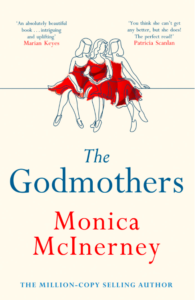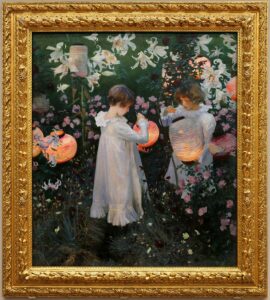
Finding love when you need it most (Australia, Scotland, Ireland, England; present-day): Once named Australia’s reading ambassador, today Australian-born Monica McInerney has been called “Queen of feel-good novels.” The Godmothers, her 13th novel, shows why those literary attributions.
On a Zoom book event, the novel’s charming cover drew my attention. The three women with matching red dresses are Eliza Maxine Olivia Miller and the two godmothers she’s named for. Maxine is a popular, openly gay actress in a TV soap drama filmed in Sydney, Australia. Olivia manages a family-owned luxury hotel, the Montgomery, in Edinburgh, Scotland, adorned with art on the walls from Scottish, Italian, French, and Australian artists. For the past nine years, detail-oriented Eliza devoted herself to conference planning in Melbourne, Australia, spending over fifty hours a week on the job, leaving little time for a personal life and friendships, though she made room for her true passion: art. Eliza knows she’s blessed to have both Maxie and Olivia in her corner. One of them always there for her “just when she needed them.”
McInerney, who splits her time between Australia and Ireland and has also lived in London, believes, “A change of scene fills your soul.” She’s delightfully filled our armchair wanderlust by creating a contemporary plot with multiple storylines that takes Eliza to different parts of the world.
Eliza has needed all the comfort in the world that her two godmothers gave her and persist on giving her, having been all too glad to sweep her away from her troubled mother to many far-flung places by the time she was seventeen. Eliza’s mother Jeannie was wise to choose her two boarding school friends to watch over and indulge her only child. They suspected their unreliable friend wasn’t telling the truth about her escapades, disappearances. That her stories of wild adventures were figments of her imagination, but they didn’t press her because they loved her. Back then, a free-spirit. As a single mother, Jeannie continued to tell fantastical stories to Eliza, painting happy images to mask how unsettled their lives were, moving to eight towns in the first eleven years of her Eliza’s childhood.
But the one thing they can’t give her that she desperately wants is to know who her father is? Her mother never told her. She promised she would when she reached eighteen, but she died before then. Fast forward more than twenty years later when Eliza is thirty and has not stepped foot into a plane since then. You’ll see why her phobia, triggered by trauma, is rational. Eliza sensed her mother was unlike other mothers; her godmothers knew more yet chose to keep potentially devastating secrets from her to protect her. Those secrets are revealed over 450 engaging pages that flow with ease.
You can’t help but root for Eliza, handling the hard-knocks of her life with such grace and diligence. Most of her story is told when the rug has been pulled out from under her carefully controlled life, when her company was bought out and she was let go.
Eliza’s story resonates from an employment perspective, her lonely path, and her and her godmothers’ complicated contemporary families. Olivia is a reluctant manager of her husband Edgar’s intended legacy hotel he’s no longer able to run, and Maxine is at a crossroads in her career having found the love of her life, Hazel, soon bound for New York City’s world of theatre.
One of the endearing qualities of Eliza’s character is how she gravitates to staying out of the limelight as a highly reliable and effective “backroom person,” while others crave the center of attention.
Another character with “something old-fashioned about him,” enters Eliza’s topsy-turvy world when she visits Olivia’s elegant hotel in Scotland. He, like Eliza, proves to be invaluably helpful and prefers to remain in the background: Lawrence, the hotel manager. With so much on her mind and used to being alone, it takes her a while to notice that he’s “a gentleman” who looks like “he’d stepped out of a black-and-white film.” One of the feel-good aspects of the novel is the way she awakens to their romantic chemistry and he courts her like a gentleman.
A third character will also win your heart: an erudite, eleven-year-old boy, Sullivan. Eliza meets him on her nervous flight from Melbourne to Edinburgh. Acutely aware he’s “more cerebral than physical,” which makes him an oddball with his peers, he too is lonely. Achingly so. Seated on one side of Eliza on the plane, an older anxious woman on the other, his emotional intelligence and formal, adult-like way of speaking is precious, like him. Assuming the role of calmer-in-chief, he counsels both women: “Sometimes it feels better to feel human touch when you’re scared.”
Sullivan is the latch-key kid we used to hear all about. His parents are divorced; he lives with his rich, physician dad who has no time or patience for him. Neither does his stepmother, busy with their newborn and worn out by his constant questions and chatter. Eliza, though, treats him with respect and sensitivity. He helps her make it through to Edinburgh where he also lives, and is rewarded when he keeps reaching out to her and she sweetly, sibling-like, empathetically lets him into her life. Their developing relationship also makes you feel good, as opposed to the author labeling or stereotyping him. He’s different. Marvelously so.
By creating characters who deserve so much more in life than they’ve been getting, McInerney enchants. The two godmothers are certainly integral to this – the best friends anyone could have. Although, keeping BIG secrets has consequences.
Much revolves around the comings-and-goings at the Montgomery, which includes Olivia’s two stepsons. One who thinks and acts like he’s God’s gift to women and doesn’t have any problems; the other the good, gentle one. Another family member, Celine, the boys’ grandmother, is a loud, insulting trouble-maker staying at the hotel who won’t leave. Rude, crude, and cruel, Lawrence has put up with her demands and shenanigans for a long while. Eliza new to the ornery woman’s lashing-out game, behaves like the pro she is wielding her magic. Beneath Celine’s armor, Eliza and the reader sense she too suffers from terrible loneliness. Eliza is the one willing to step in.
Maxine is dealing with a lot too. Again, Eliza offers to help her, this time having to fly to London, where she discovers something at the heart of her story: a way to perhaps find her father, her identity – this time taking her to Ireland where her backstory comes together. When it does, it’s sorrowful and joyful.

by John Singer Sargent
Photo by Sailko [CC BY 3.0]
via Wikimedia Commons
Art is a common, elevating thread. Eliza loves painting, finds art a “great solace.” John Singer Sargent’s painting, “Carnation, Lily, Lily, Rose” holds special meaning for her. Olivia’s passion is art history, funneled into all those magnificent paintings lining the hotel walls. Easygoing stepson Rory’s interests lie outside of the hotel to a different art form: painting wooden puzzles. Maxine and Hazel are drawn to acting viewed on the TV screen and live on stage.
When Eliza realizes “how soothing it was to be in his [Lawrence] presence,” the same can be said of the novel. Soothing in spite of all the “messes” Eliza sorts out.
The ending will make you feel so good. Like Sargent’s glowing lanterns.
Lorraine